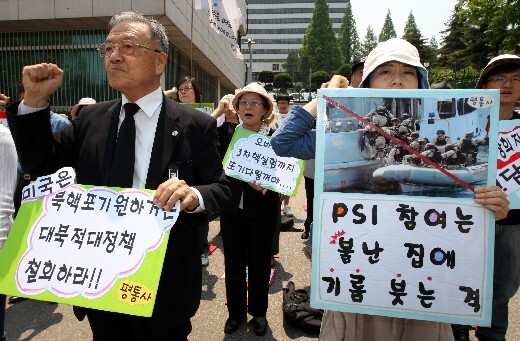hankyoreh
Links to other country sites 다른 나라 사이트 링크
S. Korea announces full-scale PSI participation and asks U.S. to apply pressure on N. Korea

South Korea announced full-scale participation in the U.S.-led Proliferation Security Initiative (PSI) on Tuesday, a move it had putting off out of consideration of inter-Korean relations. North Korea engaged in a second day of testing, launching two more short-range missiles along the East Coast that afternoon. The United Nations Security Council is moving towards adopting a resolution placing additional sanctions on North Korea following its second nuclear test, and meanwhile, inter-Korean relations and the political situation on the Korean Peninsula are becoming extremely tense.
Mun Tae-young, a spokesperson for the Foreign Ministry said, “South Korea’s government decided on May 26 to become a full participant in PSI in order to counter the serious crisis of world peace and security due to the proliferation of missile and weapons of mass destruction.” Spokesperson Mun added, “However, South Korea will continue to apply the marine transport agreement between South Korea and North Korea.”
North Korea has already said it would interpret full participation in PSI as a declaration of war, and has threatened an immediate hardline response. Accordingly, North Korea’s continued launching of short-range missiles for a second day has caused concerns about unpredictable situations that could develop, including localized military clashes along the Northern Limit Line (NLL) in the West Sea. A South Korean government source said that on Monday afternoon, South Korean intelligence detected the launch of two short-range missiles into the East Sea from a base near Hamhung, Hamgyongnam-do.
Gen. Kim Tae-young, chairman of the Joint Chiefs of Staff, convened a meeting of top commanders at the Defense Ministry on Tuesday morning. Prior to the meeting, one Army corps commander reported that they were going on higher alert due to concerns of a provocation in the Joint Security Area (JSA) of Panmunjeom and the North-South joint management zone along the DMZ. Moreover, Navy 2nd Fleet Deputy Commander Ko Han-seok explained that 113 Chinese fishing boats were operating off Yeonpyeong-do in the West Sea, and another 174 were operating off Daecheong-do. He expressed concern of a clash between North Korean and South Korean patrol boats as they deal with illegal Chinese fishing boats near the NLL.
President Lee Myung-bak communicated with U.S. President Barack Obama by phone to ask the U.S. to apply pressure on instead of dialogue with North Korea after conveying South Korea’s decision to become a full participant in PSI. Spokesman Lee Dong-kwan reported that Lee said we needed to remember that North Korea had received compensation, including a reopening of dialogue with the U.S., from the international community when it conducted its first nuclear test in October 2006. The spokesman added the president’s conclusion, therefore, is that the international community needs to work closely together to respond so that the patterns of events are not repeated. The White House said President Obama expressed thanks for South Korea‘s announcement of its full-scale participation in the PSI.
The government is claiming that PSI is already an international norm, however, controversy that it infringes upon foreign vessels’ right of innocent passage, and violates the United Nations charter, which forbids the use of force except in self-defense, continues. North Korea and China have not joined PSI.
Please direct questions or comments to [englishhani@hani.co.kr]
Editorial・opinion
![[Column] Season 2 of special prosecutor probe may be coming to Korea soon [Column] Season 2 of special prosecutor probe may be coming to Korea soon](https://flexible.img.hani.co.kr/flexible/normal/500/300/imgdb/original/2024/0426/3317141030699447.jpg) [Column] Season 2 of special prosecutor probe may be coming to Korea soon
[Column] Season 2 of special prosecutor probe may be coming to Korea soon![[Column] Park Geun-hye déjà vu in Yoon Suk-yeol [Column] Park Geun-hye déjà vu in Yoon Suk-yeol](https://flexible.img.hani.co.kr/flexible/normal/500/300/imgdb/original/2024/0424/651713945113788.jpg) [Column] Park Geun-hye déjà vu in Yoon Suk-yeol
[Column] Park Geun-hye déjà vu in Yoon Suk-yeol- [Editorial] New weight of N. Korea’s nuclear threats makes dialogue all the more urgent
- [Guest essay] The real reason Korea’s new right wants to dub Rhee a founding father
- [Column] ‘Choson’: Is it time we start referring to N. Korea in its own terms?
- [Editorial] Japan’s rewriting of history with Korea has gone too far
- [Column] The president’s questionable capacity for dialogue
- [Column] Are chaebol firms just pizza pies for families to divvy up as they please?
- [Column] Has Korea, too, crossed the Rubicon on China?
- [Correspondent’s column] In Japan’s alliance with US, echoes of its past alliances with UK
Most viewed articles
- 1‘We must say no’: Seoul defense chief on Korean, USFK involvement in hypothetical Taiwan crisis
- 2[Column] Season 2 of special prosecutor probe may be coming to Korea soon
- 3N. Korean delegation’s trip to Iran shows how Pyongyang is leveraging ties with Moscow
- 4Korea sees more deaths than births for 52nd consecutive month in February
- 5Amnesty notes ‘erosion’ of freedom of expression in Korea in annual human rights report
- 6[Reportage] On US campuses, student risk arrest as they call for divestment from Israel
- 7[Editorial] New weight of N. Korea’s nuclear threats makes dialogue all the more urgent
- 8‘Weddingflation’ breaks the bank for Korean couples-to-be
- 9[Column] Has Korea, too, crossed the Rubicon on China?
- 10[Column] Park Geun-hye déjà vu in Yoon Suk-yeol